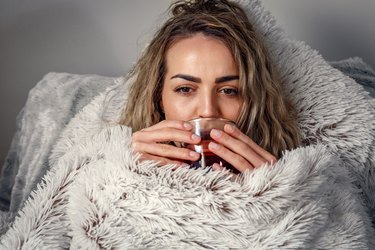
If you have an unrelenting, mucusy cough, you know how miserable life with bronchitis is. So what's the fastest way to get mucus out of your chest? You can try over-the-counter cough medicines, and sip on tea with honey and lemon to soothe your sore throat.
According to the National Heart, Lung, and Blood Institute (NHLBI), bronchitis is the swelling and inflammation of the tubes that carry air from your mouth to the lungs. As your body is fighting off an infection, these swollen airways create a thickened, discolored mucus and cause a cough that brings up the mucus, shortness of breath and chest discomfort. You may also experience fever, chills, fatigue and other cold symptoms, says Mayo Clinic.
Video of the Day
Video of the Day
Acute bronchitis, often called a chest cold, usually goes away on its own, so home remedies can help soothe your symptoms while you're waiting. Adults should talk to their pharmacist about which, if any, over-the-counter medicines to take, says the Centers for Disease Control and Prevention. (They won't cure the problem but might offer a temporary respite from symptoms.)
A word of caution: over-the-counter (OTC) cough and cold medicines should not be given to young children because of potentially serious side effects, such as slowed breathing, says the U.S. Food and Drug Administration. The American Academy of Family Physicians says most doctors do not recommend these OTC meds for children under age 6, noting the potential for overdose and a lack of evidence that these products can relieve kids' symptoms.
Ibuprofen or acetaminophen can provide pain and fever relief, but consult a doctor before giving these meds to children younger than 2, says FDA.
According to the CDC, it also helps to use a humidifier and stay hydrated with clear fluids to help loosen mucus — and that's where tea with honey and lemon can help.
Why Honey and Lemon
What we know about honey. There are no studies of honey on bronchitis specifically, but honey has antibacterial and anti-inflammatory properties and may soothe the cough and sore throat that come with bronchitis, according to Asha Devereaux, MD, MPH, a pulmonary specialist in Coronado, California.
Research involving children suggests that honey can help quell coughs. A review of studies published in April 2018 in Cochrane Database of Systematic Reviews concluded that, in children, honey is helpful. However, never give honey to babies under a year old, as there's a risk of botulism. Even for older children, make sure you're giving pasteurized honey, as raw honey can harbor bacteria that can make them sick.
According to Dr. Devereaux, Manuka honey has the best anti-inflammatory properties, but others, including orange blossom, rosemary, eucalyptus and wildflower honey, are also good. Try a spoonful of honey before bed or dilute it in warm water with lemon.
"Another way to take it is to mix it in tea because green tea and black tea have antioxidant properties," Dr. Devereaux says. "So just put a spoonful of honey in a little tea with a little lemon, and then you get a variety of anti-inflammatories as well as the warm soothing benefits." Adults looking for daytime relief can try caffeinated tea, but in the evening and at all times for children under 12, go decaf.
What we know about lemon. There haven't been any direct studies on the effects of eating lemons or drinking lemon juice for bronchitis, but lemon's chief antioxidant, vitamin C, has anti-inflammatory effects, so get as much as possible when you're feeling sick.
The Office of Dietary Supplements says the recommended amount of vitamin C per day is 90 milligrams for men and 75 milligrams for women. The daily upper limit for vitamin C is 2,000 milligrams for adults (taking too much can cause gastrointestinal issues like diarrhea and stomach cramps).
Lemon and other citrus fruits are a great way to get more vitamin C. "[Lemon will] be soothing if you mix it in with the tea in the honey, and you'll get about 10 milligrams of vitamin C," Dr. Devereaux says. "It would be just a mild supplement to the anti-inflammatory effects of honey."
When to See a Doctor
According to the CDC, call your doctor if you have any of these symptoms:
- Cough lasts more than three weeks.
- Trouble sleeping due to cough.
- Discolored mucus or blood.
- Wheezing.
- Shortness of breath.
- Fever higher than
100.4 F.
When you have a mucus-laden cough, the best thing to do is take good care of yourself, get rest and stay hydrated. A cup of warm tea with honey or lemon may do the trick.
Read more: Is Cold or Hot Better for a Sore Throat?
- National Heart, Lung, and Blood Institute: “Bronchitis”
- Centers for Disease Control and Prevention: “Chest Cold (Acute Bronchitis)”
- Asha Devereaux, MD, MPH, pulmonary medicine specialist, Coronado, California
- Cochrane: “Honey for Acute Cough in Children”
- Office of Dietary Supplements: “Vitamin C”
- Mayo Clinic: "Bronchitis-Symptoms and Causes"
- U.S. Food and Drug Administration: "When to Give Kids Medicine for Coughs and Colds"
- American Academy of Family Physicians: "OTC Cough and Cold Medicines and My Child"
Is this an emergency? If you are experiencing serious medical symptoms, please see the National Library of Medicine’s list of signs you need emergency medical attention or call 911.